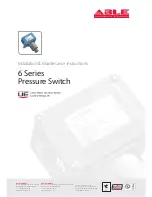
5
Transport and storage
Ensure the following storage conditions are met:
Short storage periods in cool, dry, shaded and corrosion−protected locations.
6
Requirements for product use
Installation and commissioning is to be carried out only by qualified personnel in
accordance with the operating instructions. When hazardous current and voltage
is involved, installation and commissioning must be performed by qualified
electricians.
Note
Improper handling can result in malfunctions.
· Make sure that all the instructions in this chapter are observed. The product
will then function correctly and reliably.
· Compare the limit values specified in these operating instructions with your
actual application (e.g. current, voltages, torques, temperatures). The product
can only be used in accordance with the relevant safety guidelines if the
maximum load limits are observed.
· If the current is higher, the mechanical service life is reduced continuously.
Service life:
at 24 V DC and ~200 mA:
1 000000 switching cycles
at 24 V DC and ~1,5 A:
100000 switching cycles
at 250 V AC and ~5 A:
6000 switching cycles
The product must be used in only one and the same circuit type throughout its
entire service life.
· Comply with all applicable national and international regulations.
· Remove the packaging. The packaging is intended for recycling
(except for: oiled paper = other waste).
· Take into consideration the ambient conditions at the location of use.
Corrosive environments reduce the service life of the product.
· Use the product only in the process industry and in an industrial environment, as
intended, in its original condition without any unauthorised modifications, in
perfect technical condition. Only the conversions and modifications described in
this documentation are permitted.
· The product is not a safety component and must only be used as designated.
· If additional commercially−available valves are connected, the specified limits
for pressures, temperatures, electrical data, torques, etc. must be complied
with.
· Please select the appropriate accessories, such as mounting adapters,
couplings and electric cable, from our catalogue www.festo.com/catalogue.
7
Installation
Caution
Uncontrolled movements of the drive can cause damage when mounting.
· Before installing the limit switch attachment, make sure the compressed air
and power supply are switched off an the semi−rotary drive is not pressurised.
· Secure the system against being switched back on.
7.1 Mechanical installation
· Use a product variant with
an appropriate mounting
adapter for your drive
(mounting kits
è
catalogue
www.festo.com/catalogue).
· In combination with the DFPB,
use only a suitable mechanical
coupling
1
.
· Mount the limit switch
attachment so that the required
working method is achieved.
1
For fastening to semi−rotary drives, the mounting adapters have a mounting hold
pattern in accordance with VDI/VDE Directive 3845
(
è
catalogue www.festo.com/catalogue).
Before mounting
1. Bring process valve into the correct end position.
2. Ensure there is no voltage or pressure.
On mounting
The limit switch attachment is supplied with a mounted mounting attachment.
1. Align the shaft of the limit switch attachment so that it, the coupling, if
applicable, and the shaft of the semi−rotary drive engage each other in the
desired manner (example, see Fig.4).
1
Semi−rotary
drive (here
DFPB)
2
Coupling for
power
transmission
3
Shaft of the
limit switch
attachment
Fig.4
1
2
3
2
2. Tighten the 4 fastening screws (Fig.1
8
) tightening torque max. 6 Nm ± 10 %.
7.2 Electrical installation
When hazardous current and voltage is involved:
Danger
Danger of death or serious bodily injury due to electric shock in case of exposed
electrical components!
· Switch off power before opening the device and when working on electrical
components.
· Connect the device to the power network in accordance with valid standards
and regulations so that it can be separated from the network with appropriate
switches (e.g. main switch).
· Connect the protective earth conductor (PE) correctly.
Warning
Installation errors can damage the electronics or cause malfunctions.
Use an electrical connecting cable with a nominal outside diameter of
8 mm ... 13 mm
Connect the earth terminal (
è
Fig.1
9
) with the earth potential with low
resistance (short cable with large cross−section) tightening torque 1.3 Nm.
The electrical connection is established via an 8−pin terminal block (
è
Fig.1
aA
).
To perform electrical installation, you have to open the device.
1. Switch off the power supply.
2. Loosen the 4 fastening screws (
è
Fig.1
3
) of the housing cover.
3. Route the electric cable through the cable connector.
4. Use the wire end sleeves suitable for the connection and wire the terminal block
according to the terminal diagram (
è
Fig.5)
cable cross section [mm³]: 0,5 ... 1.5; tightening torque 0.5 Nm.
Terminal diagram
1)
Brief description
Upper micro switch: changeover switch
(valve closed)
Lower micro switch: changeover switch
(valve open)
MV = solenoid valve (optionally usable for
passing through the control signal for the
solenoid valve)
1)
The terminal plan is attached to the inside of the housing cover.
Fig.5: SRBF−C terminal plan
5. Connect the earth terminal (PE
è
Fig.1
9
) with the earth potential with low
resistance (short cable with large cross−section) tightening torque 1.3Nm.
6. Tighten the union nut of the cable connector tightening torque 4 Nm. With this
you ensure pull resistance and IP protection.





















